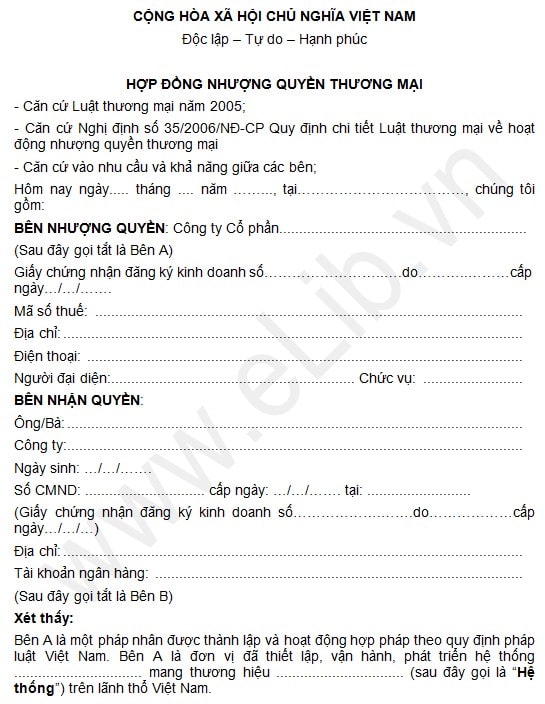Along with the current economic development, commercial businesses and franchising are becoming more popular. Franchising agreements concluded between domestic enterprises, or between domestic enterprises and foreign enterprises represent a significant increase and development. Thus, How does the Vietnamese Law stipulate a franchising agreement? What contents need to be considered when drafting a franchising agreement?. Please understand the following issues regarding franchising with NPLaw.
Currently, there aren’t any regulations that particularly define a franchising agreement, even Commercial Law 2005 (which was amended and supplemented in 2017) is also the definition of franchising. Thus, according to the definition of franchising and the contract, we can define a franchising agreement, as follows:
A franchising agreement is an agreement between the parties, whereby a franchisor allows and requires a franchisee to perform the purchase and sale of goods, and logistics according to certain conditions.
 II. Contents of the franchising agreement
II. Contents of the franchising agreement
The franchising agreement includes many different contents, but there is some basic content, as follows:
Therefore, if the parties choose to apply the Vietnamese Law, the franchising agreement can have the above contents.
Some regulations regarding the franchising agreement are stipulated, as follows:
A contract is an agreement between the parties, so the parties will agree upon the duration of the franchising agreement. In some cases, the franchising agreement can terminate before the agreed duration.
The franchising agreement includes a franchisor(2) and a franchisee(3). However, no subject is also entered into the franchising agreement, subjects that satisfy conditions according to the Law are allowed to implement the franchising.
Pursuant to Article 8 of Decree 08/2018/ND-CP amending some decrees related to business conditions under the state management of the Ministry of Industry and Trade, the franchisor has to be a merchant(4), and the business system expected to be used has operated for at least one (1) year.
Pursuant to Article 6 of Decree 35/2006/ND-CP, particularly stipulating the Commercial Law on franchising activities, the franchisee has to be a merchant, and is entitled to receive commercial rights when there is a business registration for professions that are appropriate to the commercial rights’ subjects.
However, Article 9 of Decree 08/2018/ND-CP stipulates that Article 6 of Decree 35/2006/ND-CP is dismissed. Thus, the applicable Law doesn’t request conditions from a franchisee in the franchising agreement.
 3. The language of a contract
3. The language of a contract
According to the applicable Law, the franchising agreement has to be implemented in Vietnamese. If the franchise is from Vietnam to a foreign country, the parties are entitled to agree upon the language of the franchising agreement.
A sample agreement for the franchising agreement, as follows:
 V. Notes need to be considered when drafting the franchising agreement
V. Notes need to be considered when drafting the franchising agreement
The contents of the franchising agreement are extremely important. Thus, the parties’ rights and benefits will be significantly impacted, if one of the contents of the franchising agreement is omitted. Some contents that the parties need to consider when drafting the franchising agreement, as follows:
If one of the parties transfers the franchise abroad, a contract has to be established in at least two different languages. Such an issue will easily cause mistakes when translating from one language to another. Therefore, a contract needs to clearly prescribe conditions and certain cases regarding the translation languages of the contract.
Conditions of contract extension are one of the basic contents of the franchising agreement. If a contract doesn’t clearly represent or the parties don’t agree upon this above, disputes will easily arise or affect one of the parties’ rights and benefits.
This is an important provision in the franchising agreement, and information confidentiality is the responsibility of the franchisee. However, a contract is also necessary to clearly and particularly prescribe this condition to ensure the parties’ benefits.
Besides, when drafting the franchising agreement, the parties need to consider other contents, such as the rights and obligations of the franchisee and the franchisor, price provisions, payment methods, etc.,
Some disputes often arise from the franchising agreement, as follows:
Pursuant to Clause 1, Article 290 of the Commercial Law 2005 (amended and supplemented in 2017), the franchisee is entitled to transfer the franchise to a third party if the franchisor agrees to it. Thus, the franchisee can be allowed to transfer the franchise to a third party.
For the franchising agreement, the parties can unilaterally terminate the agreement. However, no case can also implement unilateral termination of the franchising agreement, the franchisor or the franchisee can only unilaterally terminate in some cases according to Article 16 of Decree 35/2006/ND-CP.
4. Consulting services and the drafting of the franchising agreement
These are all information relating to THE FRANCHISING AGREEMENT ACCORDING TO THE LAW IN VIETNAM as prescribed by Vietnamese Law. Please don’t hesitate to contact us, if the clients have any further questions. NPLaw is willing to support the Client in resolving all issues regarding the franchising agreement with the best efforts, especially in drafting.
NPLAW is proud to be a prestigious law firm unit and has the trust and belief of clients, enterprises, and individuals. NPLaw specializes in providing legal services all-around relating to domestic and abroad investments such as Enterprise, Real Estate, Intellectual Property, Labor; drafting consultation, negotiation and concluding support for the Commercial Contract, domestic and abroad Service Contract; consultations and support for implementing licensed procedures of licenses, etc,. NPLaw, with our professional Lawyers and Specialists, we have the full ability to consult with and support customers as they implement the above procedures. Along with the slogan “Your benefits - Our Priority”, NPLaw definitely becomes the accurate, and safe choice for your legal issues.
NPLaw Firm
Hotline: 0913 449968
Email: legal@nplaw.vn
CÔNG TY LUẬT TNHH NGỌC PHÚ
Tổng đài tư vấn và CSKH: 1900 9343
Hotline: 0913 41 99 96
Email: legal@nplaw.vn